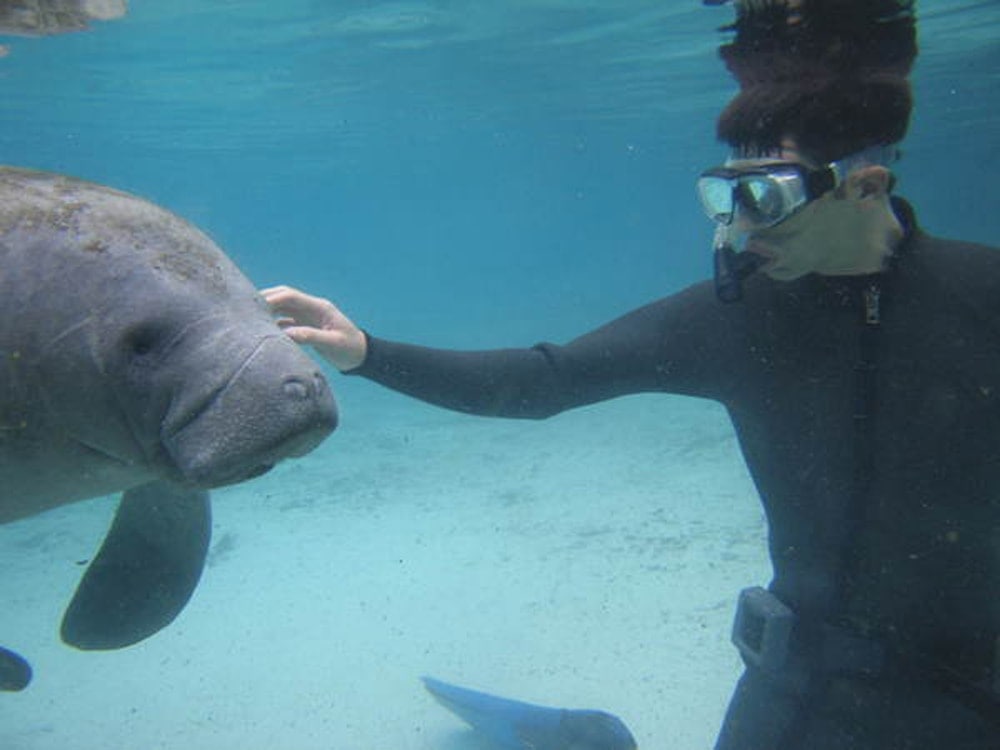
Daniel Gonzalez-Socoloske,
assistant professor of biology at Andrews University in Berrien Springs,
Michigan, is currently in his first year on campus. He specializes in tropical
mammal ecology and conservation and has been studying manatees for the past 10
years.
Gonzalez-Socoloske graduated from
Andrews in 2003 with a Bachelor of Science in biology with a zoology emphasis.
He went on to receive his master’s degree in biology from Loma Linda University
(LLU) in California and later his PhD in ecology from Duke University in North
Carolina.
His interest is how species adapt
to their environment and the effect of both natural and human-induced habitat
changes on their behavior. His research focus is the behavioral ecology and
plasticity of various tropical mammals and his aim is to incorporate behavioral
data into sound conservation strategies that are species- and
location-specific.
“I was one of those rare freshmen
that went in thinking, ‘I want to do biology,’” he says. “I always wanted to
pursue it more because it was something that I genuinely loved.”
Gonzalez-Socoloske was first
introduced to manatee research when he began working on his master’s degree at
LLU. “I was always interested in wildlife and I was always interested in
mammals,” he says. “It was just a matter of honing in on a particular area.”
Manatees posed a beneficial area of
study because of the lack of research on them. Now, Gonzalez-Socoloske’s
expertise lies within manatee research and his work has contributed to the
advancement of study in this area.
“I went in with a lot of
preconceived ideas as to what manatees were and their behavior,” he says.
“Through the years I’ve gained an awesome respect for these creatures and
realized they are much more complex than I initially gave them credit for.
They’re much more intelligent than people typically think.”
Not only did he have the
opportunity to work with manatees in the U.S., Gonzalez-Socoloske traveled to
more than five countries in Central America to further study the creatures.
This summer he will be working on an island off of Cuba, which differs from the
tannin-stained water of river systems with which he is used to working.
“Every location has unique
challenges and you bond with the people there,” he says. “Each spot has its own
charm.”
For his PhD work in feeding
ecology, he did distribution studies in Honduras focusing on the behavior of
manatees. On-site, he and his team were able to capture the manatees, radio-tag
them and track them. The water at the site varied by almost 20 feet between the
dry season and the wet season affecting the food availability of the
herbivorous mammals. Although they are generalists with a wide variety of food
they can eat, manatees are picky about what they consume.
With colleagues not
only in Honduras and Cuba, but Mexico, Japan, Costa Rica, and Panama, he seeks
to continue his research and hopes to incorporate his studies into the classes
he teaches.
One day, he hopes to bring graduate students
on the trips as part of their coursework. “Having a research program for
students tremendously enriches their experience,” he says. “It opens their
world to something larger than themselves, larger than their own unique goals.”
As far as his teaching career, Gonzalez-Socoloske
says that his research creates a more concrete foundation to the concepts he
teaches because of his real-world experience and application. “Students
can see that we are teachers, but we are biologists first,” he says. “They can
see that we are a community of science and they can see what we are striving to
do.”
One of the highlights from his
research occurred in Tabasco, Mexico, where he concluded data research for his
PhD. It was the dry season when he and his team encountered an adult female
separated from the other manatees, a highly unusual incident, as they are
usually shy and hard to see.
After wading in the water for some
time, the seven and a half foot manatee, later named Francisca, approached the
team sociably and wanted to interact with them. The unique behavior of this
manatee allowed the team to study her closely. Two years later, when
Gonzalez-Socoloske returned to the site, Francisca was spotted in the very same
area.
“When you connect the local
community to an individual creature like Francisca,” he says, “it was so
amazing to see the transformation of how the people began looking out for her
and there was an acceptance and an accountability that was built into having
this experience with this animal.”
Gonzalez-Socoloske has not only
grown attached to manatees, but continues to enjoy what he does for a living.
“Research was important to me early on,” he says, “to fall in love with
science. I was already in love with nature. I enjoyed tremendously working with
animals and being outside. Engaging in the research really helped me to enjoy
the element of discovery and pushing the frontiers of our knowledge.”